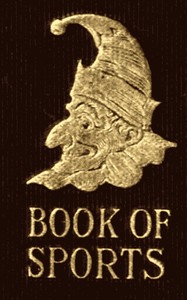Mr. Punch in Bohemia, Various [most inspirational books .TXT] 📗

- Author: Various
Book online «Mr. Punch in Bohemia, Various [most inspirational books .TXT] 📗». Author Various
 The Great Prize Fight.
The Great Prize Fight.
Johnnie (who finds that his box, �20, has been appropriated by "the Fancy"). "I beg your pardon, but this is my box!"
Bill Bashford. "Oh, is it? Well, why don't you tike it?"
[Pg 164]
 Without Prejudice.
Without Prejudice.
Ugly Man (who thinks he's a privileged wag, to artist). "Now, Mr. Daubigny, draw me."
Artist (who doesn't like being called Daubigny, and whose real name is Smith). "Certainly. But you won't be offended if it's like you. Eh?"
[Pg 165]

Scrimble. "So sorry I've none of my work to show you. Fact is, I've just sent all my pictures to the Academy."
Mrs. Macmillions. "What a pity! I did so much want to see them. How soon do you expect them back?"
[Pg 166]
THE YOUNG NOVELIST'S GUIDE TO MEDICINEChloroform. Invaluable to writers of sensational stories. Every high-class fictionary criminal carries a bottle in his pocket. A few drops, spread on a handkerchief and waved within a yard of the hero's nose, will produce a state of complete unconsciousness lasting for several hours, within which time his pockets may be searched at leisure. This property of chloroform, familiar to every expert novelist, seems to have escaped the notice of the medical profession.
Consumption. The regulation illness for use in tales of mawkish pathos. Very popular some years ago, when the heroine made farewell speeches in blank verse, and died to slow music. Fortunately, however, the public has lost its fondness for work of this sort. Consumption at its last stage is easily curable (in novels) by the reappearance of a hero supposed to be dead. Two pages later the heroine will gain strength in a way which her doctors—not unnaturally—will describe as "perfectly[Pg 168] marvellous." And in the next chapter the marriage-bells will ring.

Doctor. Always include a doctor among your characters. He is quite easy to manage, and invariably will belong to one of these three types: (a) The eminent specialist. Tall, imperturbable, urbane. Only comes incidentally into the story. (b) Young, bustling, energetic. Not much practice, and plenty of time to look after other people's affairs. Hard-headed and practical. Often the hero's college friend. Should be given a pretty girl to marry in the last chapter. (c) The old family doctor. Benevolent, genial, wise. Wears gold-rimmed spectacles, which he has to take off and wipe at the pathetic parts of the book.
Fever. A nice, useful term for fictionary illnesses. It is best to avoid mention of specific symptoms, beyond that of "a burning brow," though, if there are any family secrets which need[Pg 170] to be revealed, delirium is sure to supervene at a later stage. Arthur Pendennis, for instance, had fictional "fever," and baffled doctors have endeavoured ever since to find out what really was the matter with him. "Brain-fever," again, is unknown to the medical faculty, but you may safely afflict your intellectual hero with it. The treatment of fictionary fever is quite simple, consisting solely of frequent doses of grapes and cooling drinks. These will be brought to the sufferer by the heroine, and these simple remedies administered in this way have never been known to fail.

Fracture. After one of your characters has come a cropper in the hunting-field he will be taken on a hurdle to the nearest house: usually, by a strange coincidence, the heroine's home. And[Pg 172] he will be said to have sustained "a compound fracture"—a vague description which will quite satisfy your readers.
Gout. An invaluable disease to the humorist. Remember that heroes and heroines are entirely immune from it, but every rich old uncle is bound to suffer from it. The engagement of his niece to an impecunious young gentleman invariably coincides with a sharp attack of gout. The humour of it all is, perhaps, a little difficult to see, but it never fails to tickle the public.

Heart Disease. An excellent complaint for killing off a villain. If you wish to pave the way for it artistically, this is the recognised method: On page 100 he will falter in the middle of a sentence, grow pale, and press his hand sharply to his side. In a moment he will have recovered,[Pg 174] and will assure his anxious friends that it is nothing. But the reader knows better. He has met the same premonitory symptoms in scores of novels, and he will not be in the least surprised when, on the middle of page 250, the villain suddenly drops dead.

Unpopular Game at the Royal Academy.—"High-sky-high!"
A Rough Wine.—Rude-sheimer.
Nervous.—Mrs. Malaprop was induced to go to a music hall the other evening. She never means to set foot in one again. The extortions some of the performers threw themselves into quite upset her.
Motto for a model Music-hall Entertainment.—"Everything in its 'turn' and nothing long."
[Pg 167]
 Breaking it Gently.
Breaking it Gently.
His Cousins. "We sent off the wire to stop your model coming. But you had put one word too many—so we struck it out."
Real Artist. "Oh, indeed. What word did you strike out?"
His Cousins. "You had written 'he wasn't to come, as you had only just discovered you couldn't paint to-day.' So we crossed out 'to-day.'"

[Pg 169]
The State of the Market.Artist (to customer, who has come to buy on behalf of a large furnishing firm in Tottenham Court Road): "How would this suit you? 'Summer'!"
Customer: "H'm—'Summer.' Well, sir, the fact is we find there's very little demand for green goods just now. If you had a line of autumn tints now—that's the article we find most sale for among our customers!"
[Pg 171]

Our Amateur Romeo (who has taken a cottage in the country, so as to be able to study without interruption). "Arise, fair sun, and kill the envious moon——"
Owner of rubicund countenance (popping head over the hedge), "Beg pardon, zur! Be you a talkin' to Oi, zur?"
[Pg 173]
 BITTERS AT THE CLUB
BITTERS AT THE CLUB
MacStodge (Pictor ignotus). "Who's that going out?"
O'Duffer (Pictor ignotissimus). "One Ernest Raphael Sopely, who painted Lady Midas!"
MacStodge. "Oh, the artist!"
O'Duffer. "No. The Royal Academician!"
[Pg 175]
 La vie de Boh�me.
La vie de Boh�me.
First Bohemian (to second ditto). "I can't for the life of me think why you wasted all that time haggling with that tailor chap, and beating him down, when you know, old chap, you won't be able to pay him at all."
Second Bohemian. "Ah, that's it! I have a conscience. I want the poor chap to lose as little as possible!"
[Pg 176]

Little Guttersnipe (who is getting quite used to posing). "Will yer want me ter tike my bun down?"
[Pg 177]

Genial Doctor (after laughing heartily at a joke of his patient's). "Ha! ha! ha! There's not much the matter with you! Though I do believe that if you were on your death-bed you'd make a joke!"
Irrepressible Patient. "Why, of course I should. It would be my last chance!"
[Pg 178]

She (to Raphael Greene, who paints gems for the R.A. that are never accepted). "I do hope you'll be hung this year. I'm sure you deserve to be!"
[Pg 179]
 ART INTELLIGENCE
ART INTELLIGENCE
She (reads). "There are upwards of fifty English painters and sculptors now in Rome——"
He (British Philistine—served on a late celebrated jury!). "Ah! no wonder we couldn't get that scullery white-washed!"
[Pg 180]

Devoted little wife (to hubbie, who has been late at the club). "Now, dear, see, your breakfast is quite ready. A nice kipper, grilled chicken and mushrooms with bacon, poached eggs on toast—tea and coffee. Anything else you'd like, dearie?"
Victim of last night (groans). "Yes—an appetite!" [Collapses.
[Pg 181]
 After Feeding-time.
After Feeding-time.
Showman of Travelling Menagerie. "Now, ladies and gentlemen, we come to the most interesting part of the 'ole exhibition! Seven different species of hanimals, in the same cage, dwellin' in 'armony. You could see them with the naked heye, only you have come too late. They are all now inside the lion!"
[Pg 182]
To Billiard Players.—If you would obey the rules of billiards, always attend to the cannons of the game.
The Suspensory Act.—Hanging the Academy exhibition.
In the Billiard Room.—Major Carambole. I never give any bribes to the club servants on principle.
Captain Hazard. Then I suppose the marker looks on the tip of your cue without interest.

[Pg 183]
 In a Bar, Newmarket.
In a Bar, Newmarket.
Seedy Individual (to Knowing One). "D'yer want to buy a diamond pin cheap?"
Knowing One. "'Ere, get out of this! What d'you take me for? A juggins?"
S. I. "Give yer my word it's worth sixty quid if it's worth a penny. And you can 'ave it for a tenner."
K. O. "Let's 'ave a look at it. Where is it?"
S. I. "In that old gent's tie. Will yer 'ave it?"
[Pg 184]
 SONGS AND THEIR SINGERS
SONGS AND THEIR SINGERS
"Yew harxed me woy hoi larved when larve should be
A thing hun-der-eamed hof larve twixt yew han me.
Yew moight hin-tereat the sun tew cease tew she-oine
Has seek tew sty saw deep a larve has moine."
[Pg 185]
 SHAKSPEARE ILLUSTRATED
SHAKSPEARE ILLUSTRATED
"Oh, my prophetic soul! My uncle!"
Hamlet, Act I., Sc. 5.
[Pg 186]
A BROTHER ARTIST ["We have regularly attended the Academy now for many years, but never do we remember such a poor show of portraits; they cannot prove to be otherwise than the laughing-stock of tailors and their customers."—Tailor and Cutter.]The tailor leaned upon his goose,
And wiped away a tear:
"What portraits painting-men produce,"
He sobbed, "from year to year!
These fellows make their sitters smile
In suits that do not fit,
They're wrongly buttoned, and the style
Is not the thing a bit.
"Oh, artist I'm an artist too!
I bid you use restraint,
And only show your sitters, do,
In fitting coats of paint;
In vain you crown those errant seams
With smiles that look ethereal,
For man may be the stuff of dreams—
But dreams are not material."
Medical.—A sculptor friend, who has strabismus, consoles himself with the thought that he can always keep his profession in view through having a cast in his eye.
[Pg 187]

Frame-maker (to gifted amateur, who is ordering frames for a few prints and sketches). "Ah, I suppose you want something cheap an' ordinary for this?"
[N.B.—"This" was a cherished little sketch by our amateur himself.
[Pg 188]
Not quite the Same.—Scene: Exhibition of Works of Art.
Dealer (to friend, indicating stout person closely examining a Vandyke). Do you know who that is? I so often see him about.
Friend. I know him. He's a collector.
Dealer (much interested). Indeed! What does he collect? Pictures?
Friend. No. Income tax.
[Exeunt severally.
Art Class.—Inspector. What is a "landscape painter"?
Student. A painter of landscapes.
Inspector. Good. What is an "animal painter"?
Student. A painter of animals.
Inspector. Excellent. What is a "marine painter"?
Student. A painter of marines.
Inspector. Admirable! Go and tell it them. Call next class.
[Exeunt students.
The Best "Publisher's Circular."—A round dining-table.
[Pg 189]
 Social Agonies.
Social Agonies.
Anxious Musician (in a whisper, to Mrs. Lyon Hunter's butler). "Where's my cello?"
Butler (in stentorian tones, to the room). "Signor Weresmicello!"
[Pg 190]

Brown. "Pity Jones has lost—his figure!"
Robinson. "Not lost, but gone before!"
[Pg 191]





Comments (0)